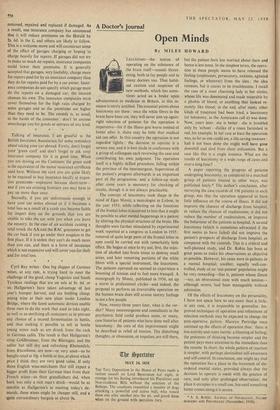A Doctor's Journal
Open Minds
By MILES HOWARD LEuccrromv--the notion of operating on the substance of the brain itself—sounds threat- ening, both to lay people and to many doctors too. That habit- ual caution and suspicion of new methods, which has some- times acted as a brake upon advancement in medicine in Britain, in this in- stance is surely justified. The essential points about leucotomy are these : once the white fibres in the brain have been cut, they will never join up again; right selection of patients for the operation is imperative—for if the illness gets 'Worse instead of better after it, there may be little that medical aid can offer. In this country the operation is not regarded lightly: the decision to operate is a serious one, and it is best made in conference with a group of colleagues each reviewing the case and contributing his own judgment. The operation itself is a highly skilled procedure, falling within the province of the neurosurgeon. Supervision of the patient's progress afterwards is an important part of the programme, and a follow-up study after some years is necessary for checking of results, though it is not always practicable.
The concept of leucotomy took shape in the mind of Egas Moniz, a neurologist in Lisbon, in the year 1933; while reflecting on the functions of the frontal lobes it occurred to him that it might be possible to alter mental happenings in a patient by altering the physical structure of the brain. His thoughts were further stimulated by experimental work reported at a congress in London in 1935: removal of quite large parts of the frontal lobes in apes could be carried out with remarkably little effect. He began at once to try out, first, the injec- tion of alcohol into brain tissue to destroy small areas, and later removing portions of the white fibres with a special instrument, the leucotome. The patients operated on seemed to experience a lessening of tension and to feel more tranquil. A monograph by Moniz, published in 1936, set up a storm in professional circles—and indeed, the proposal to perform an irreversible operation on the human brain does still arouse stormy feelings in not a few people.
Now, twenty-three years later, what is the ver- dict? Many neurosurgeons and consultants in the psychiatric field could produce some, or many, case histories of patients who have done well after leucotomy : the core of this improvement might be described as relief of tension. The disturbing thoughts, or obsessions, or impulses, are still there, but the patient feels less worried about them and hence is less tense. In the simplest terms, the opera- tion in these people seems to have released the feeling (unpleasant, persecutory, anxious, agitated feelings, or whatever) from the idea : the idea remains, but it ceases to be troublesome. I recall the case of a most charming lady in her sixties, whose life was dominated and made miserable by a phobia of blood, or anything that looked re- motely like blood; in the end, after many other 'kinds of treatment had been tried, a leucotomy (or lobotomy, as the Americans call it) was done.
Now, years later, she is better : she is troubled only by 'echoes'—dislike of a room furnished in red, for example. In her case at least the operation was, as far as one could see, a life-saving measure : had it not been done she might well have gone downhill and died from sheer exhaustion. But a case like this is a single instance. What are the results of leucotomy in a wide range of cases and over a long time?
A paper reporting the progress of patients undergoing leucotomy, as compared to a matched group of patients treated in other ways, was published lately.* The author's conclusion, after surveying the case-records of 198 patients in each group, was that the operation appeared to have little influence on the course of illness. It did not improve the chances of discharge from hospital, or reduce the chances of readmission; it did not reduce the number of readmissions, or improve the behaviour of the patients in hospital. A second leucotomy (which is sometimes advocated if the first seems to have failed) did not improve the patient's prospects of discharge from hospital, as compared with the controls. This is a critical and well-planned study, and Dr. Robin has been at great pains to make his observations as objective as possible. However, his cases were in-patients in a mental hospital; another, equally well-con- trolled, study of an 'out-patient' population might be very rewarding—that is, patients whose illness —say, an obsessional state with much tension— although severe, had been manageable without admission.
Of the effects of leucotomy on the personality, I have not space here to say( more than a little; in any case, it is impossible to generalise. Im- proved techniques of operation and refinement of selection methods may be expected to change the post-operative picture: Maurice Partridge once summed up the effects of operation thus : there is less activity and more inertia: a blunting of feeling;
the processes of thinking become simpler and the patient pays more attention to the immediate than
the remote. In short, the wholeyattern of reaction is simpler, with perhaps diminished self-awareness and self-control. In conclusion, one might say, that
the operation has a place in the treatment of dis- ordered mental states, provided always that the decision 'to operate is made with the greatest of care, and only after prolonged observation; the place it occupies is a small one, but until something better comes along it is secure.
4. A. A. Robin: JOURNAL OF NEUROLOGY, NEURO- SURGERY AND PSYCHIATRY (November, 1958).






































 Previous page
Previous page